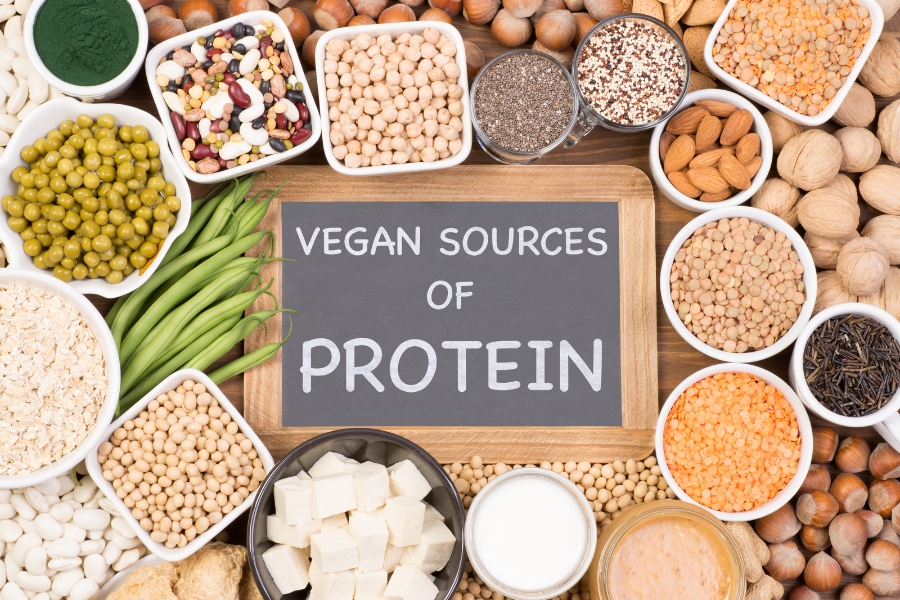
Browse our fun-packed, helpful plant-based articles, and delve deeper into this healthy, sustainable lifestyle!




Mindful Eating Practices for Plant-Based Emotional Wellness
Plant-Based Lifestyle Tips For Women
Author: Plant-Based Susy
Not all vegans have healthy eating habits
Recently, we were fortunate to attend a course on mindfulness, a common wellness buzzword. We discovered that the practice has ancient roots and forms part of several millennia-old religions.
The philosophy of mindfulness means focusing intentionally on the present moment, whether your thoughts, emotions, or physical sensations.
Learning to eat mindfully can solve challenges of poor diet, over-eating, emotional eating, and weight gain. Let’s dive into mindful eating habits and how to overcome emotional eating on a plant-based diet.
Cultivate mindful eating habits to stop emotional eating by sitting quietly, focusing on your breath, and doing a body scan before eating. Decide if you are hungry or if you are emotional. Make intentional food and portion choices. Eat without distraction. Stop eating when you are full, expressing gratitude.
Although a plant-based diet can be a wholesome option, not all vegans have healthy eating habits and can fall prey to eating disorders. Adopting mindful eating practices can help you overcome emotional eating, grow a harmonious relationship with food, and inspire you to follow a healthier plant-forward eating plan.
Let’s look at how to use mindful eating to enhance your wellbeing and guide you to a healthier lifestyle.

Table of Contents:
What Is Mindful Eating?
Mindfulness is a form of meditation originally based on Zen Buddhism.
People have flocked to this practice because of its benefits for mental and physical health, including self-calming, emotional regulation, management of pain, depression, sleep disorders and anxiety.
This practice can also change eating behaviour, referred to as mindful eating. Nutrition experts — and many fans of Vegan Susy needing to lose weight or improve our healthy eating habits — have found that restrictive eating plans are only effective in the very short term.
However, behavioural change, as in mindful eating, is highly effective.
This approach has nothing to do with dietary or nutritional issues like calories. The purpose is not to lose weight. Instead, mindful eating means using your physical senses and concentrating on your food choices and the eating experience.
Mindful eating is not outcomes-driven but process-based — you experience the moment, not concerning yourself with dietary restrictions or distractions. The immediate result is eating less, savouring more, and choosing healthy foods.
This improves the eating experience as you tend to make satisfying, nourishing food choices and experience gratitude for the food. You also become aware of harmful eating habits and can take steps to change any unwanted behaviour.
The opposite of mindful eating can be mindless eating when you haven’t planned to eat but find yourself snacking.
Another possibility is distracted eating, for example, when you plan to eat but do so while working, watching TV, reading, or scrolling through your phone. In both cases, you are not focused on what you are eating or enjoying the meal.
Emotional eating is another eating habit that detracts from a mindful eating experience. Here, you are not distracted. Instead, the reasons for eating and the food choices are driven not by a desire for nutrition or physical satiety but by anxiety or another emotion.
Mindless and emotional eating are associated with over-eating and weight gain. Mindful eating habits can help you become aware of your behaviour rather than simply eating with distraction or reacting to emotional and other stimuli without thinking.
If you want to learn more about vegan weight loss, read Vegan Susy’s Shed Pounds Naturally: Plant-Based Strategies for Weight Loss Success.

The Challenge of Emotional Eating
Food plays a massive role in our lives and is present at celebrations like birthdays and sad events like funerals. Turning to food as comfort is common and socially acceptable, especially when we can’t deal with emotions otherwise.
Eating in response to feelings rather than hunger or a subliminal need for nutrition is called emotional eating. In other words, eating is the vehicle you choose to suppress your emotions rather than deal with them.
Apart from tasting good and making our bellies full, eating is satisfying because it triggers the reward system in your brain. Dopamine, the feel-good hormone, is released, making us feel better and making the emotional eater want to eat more.
Emotional eating becomes a problem when it replaces other ways of tackling or expressing emotion, becoming your default way to cope with stress, anxiety, boredom, loneliness, sadness or exhaustion. Unfortunately, eating does not address the underlying issue, fix the unmanageable feelings, or fill a void.
According to Healthline, common triggers for emotional eating include:
Financial stress
Challenges at work
Health or medical issues
Relationship problems
Inability to understand, process, and describe emotions
Emotional dysregulation or an inability to manage your emotions
Turning to food as a coping mechanism is unhealthy because you tend to overeat, ignoring your body’s signals that it is full. You also may feel guilty and ashamed at over-eating, creating further negative emotions and feeding into the emotional eating cycle.
Over time, emotional eating becomes a habit, done automatically and without awareness. If you always eat when faced with emotions:
You’ll reach for food at the first sign of stress or powerful emotions without realising what you are doing.
You may feel out of control around other food.
You’ll have the urge to eat even when you’re not hungry.
You may use food as a reward or calming tool.

How To Cultivate Mindful Eating Habits
Mindfulness is a powerful tool for mental health, including managing anxiety, depression, and emotional eating. Specifically, mindful practices encourage you to pay attention to the present and thereby deal with emotional triggers to overeating.
The Raisin Eating Practice
How do you learn to eat mindfully? One of the most famous and influential mindful eating practices is eating a raisin, as devised by Kabat-Zinn. We found this very powerful and recommend you try it.
Put a single raisin on the table in front of you. Resist the urge to snaffle down a handful.
Imagine you have never seen or tasted a raisin. Take a few breaths.
Look carefully at the raisin, its colours and shadows, and then pick it up.
Feel the weight and texture of the raisin. Gently rub your fingers over its ridges and wrinkles and feel its stickiness or dryness.
Smell the raisin.
Squeeze the raisin and listen to the sounds it makes in your fingers.
Pause and think about what you have discovered so far.
Put the raisin between your lips and taste it with the tip of your tongue. How does your body react?
Roll the raisin around in your mouth.
Bite down on the raisin. What do you taste?
Slowly begin to chew. Continue chewing until it is broken down.
Swallow the raisin, closing your eyes and reflecting on the experience.
This is a focused example of mindful eating, drawing out the sensual experience of a single food item and your awareness of it. There is no requirement of your experience or judgement of what you find. It is simply an observed experience of eating.

Mindful Eating Habits
Mindful eating experts explain that there are four aspects that mindful eating helps you to consider:
1. Why we eat what we eat
2. What to eat
3. How much to eat
4. How to eat
Within these four parameters, let’s look at developing mindful eating practices to stop emotional eating.
1. Why We Eat What We Eat
Before automatically reaching for food, sit quietly and focus on your breath.
Do a body scan to discover any tension you’re holding. Purposefully relax them one by one.
Focus on the present and your environment: what can you hear, see, smell, and touch?
Listen to internal and external cues to make decisions around food and eating, such as whether you’re eating out of hunger or automatically in response to a trigger.
If you realise you don’t need to eat, listen to a guided meditation.
2. What To Eat
If you are hungry, be intentional about what you eat, for instance, whether it suits your body, or your soul, or the environment, or all three.
Respect where the food came from, who prepared it, and how it was prepared.

3. How To Eat
Sit down to eat without overt distractions.
Fully experience your meal or snack by focussing on the food’s flavour, texture, appearance, and aroma. Pause to check in with your senses, enhancing your enjoyment of the food.
Eat slowly, savouring each mouthful by chewing carefully.
Sit down to eat at the exact times each day to develop a habit of eating every three to four hours.
Be compassionate, and don’t judge your behaviour. Observe how you behave around eating and recognise the triggers. Remember that mindful eating is a process and will require patience and dedication.
4. How Much To Eat
Choose modest portions to avoid over-eating and food waste. Use a smaller plate and dish up only once.
Recognize when you have eaten enough (when you’re about 80% full). Stop eating, even if there is food on the plate.
Acknowledge how your body feels after eating.
Express gratitude for the meal before and afterwards. Increased gratitude leads to a deeper connection with the food.
Don’t skip meals as this can lead to “hangry” emotional episodes where you are likely to over-eat whatever food is most accessible – this may be junk or highly processed food.
The Positive Impact of Mindful Eating
Cultivating mindful eating habits can have an incredible impact on your body, your emotions, and even the environment. You will develop a happier, healthier relationship with food and improve your psychological well-being.
Mindful Eating and a Plant-Based Diet
The Association of British Dieticians note that mindful eating has positive impacts. For example, mindful eating practices often lead to or are associated with a higher quality, plant-based diet because of reflection on where your food comes from and how food options affect you and the environment.
Once people seriously reflect on what they’re eating and how animals are farmed, a plant-forward diet makes sense regarding ethics and sustainability.
Another aspect mindfulness causes you to reflect on is your health. The long-term effects of eating processed meats, sugar, and saturated fats are detrimental to your body, leading to a higher risk of cancer, heart disease, and diabetes. Similarly, eating overly large portions can lead to obesity and diabetes.
Mindful eating tends to lead to healthier food choices and smaller portions of calorie-dense foods. People following this approach choose whole, unprocessed plant-based foods, such as fresh fruit and vegetables, legumes, and whole grains.
To learn more about the benefits of plant-based eating, look at Unique Benefits of the Plant-Based Diet for Women.

Mindful Eating and Your Emotions
One of the most significant impacts of mindful eating and changing to a vegan diet is the transformation of your eating habits and treating binge eating, distracted eating, and depression. Mindful eating is also responsible for overcoming emotional eating.
Imagine being free of the cycle of guilt and shame! Vegan Susy would like nothing more than for you to live like this!
Enjoying mindful eating of a plant-based diet, you will experience a sense of overall well-being. This will spring from an improved control over your emotions and emotion-related eating, as well as your sense of contributing to a more sustainable, compassionate planet.
A positive impact of a plant-forward diet is an improvement in mood, which further supports overcoming emotional eating. A study reported in the British Journal of Psychiatry found reduced symptoms of depression in people eating whole, plant-based foods.
Plant foods improve mood because of their high antioxidant and phytochemical content, nutrients which help repair damage and inflammation in brain cells and restore neurotransmitter balance.
The phytonutrient quercetin — only found in plants — increases the amount of “happy chemicals” serotonin, dopamine, and norepinephrine in the brain, functioning as a natural antidepressant. Quercetin-rich foods include apples, berries, grapes, kale, and onions.
Tryptophan, a plant-based amino acid, is another natural antidepressant, one of serotonin's building blocks. Get a boost by eating leafy greens, broccoli, sunflower seeds, peas, watercress and soya beans.
Mindful Eating and Your Body
Once you incorporate mindfulness into your plant-based eating habits, you will experience several positive results:
More energy, as you are eating more nutritious foods
Lower blood pressure
Improved digestion, with the boost in fibre
Greater satisfaction after eating smaller portions
Maintenance of blood glucose levels
Reduced risk of stroke, heart disease, and diabetes
Weight loss.
Read Find Inner Peace, Plant-Based: Managing Stress with Food in Your 40s to learn more about the positive impact of plant-based and mindful eating.
Frequently asked questions
What is mindful eating?
Mindful eating is being fully present while eating—focusing on flavors, hunger cues, and emotions.
How can mindful eating help with emotional eating?
It helps you recognize emotional triggers, make intentional food choices, and stop when full.
Can a plant-based diet support mindful eating?
Yes! Whole, plant-based foods promote better digestion, satiety, and mindful nourishment.
What is the raisin eating practice in mindfulness?
A technique that encourages slow, intentional eating to enhance awareness and satisfaction.
How do I start practicing mindful eating?
Begin by eating without distractions, chewing slowly, and listening to your body’s hunger signals.
Conclusion:
Mindful eating is a transformative experience, as it helps you connect with your body’s emotional and physical needs. By cultivating mindful eating habits, you can overcome disorders like emotional eating, make conscious plant-based food choices, and develop a positive relationship with food.

💚 "Happy Plant-Based Eating & Exercising!" 💚

Plant-Based Susy
Plant-Based Nutrition Professional & Weight Loss Coach
Empower Yourself: Embark on a Delicious Fat Loss Adventure



🍉 Get Ready to Jump Start Your Fitness Goals AND DISCOVER A HEALTHIER YOU!
🍉 Let's Make Your Fat Loss & Optimum Health Journey a Delicious Success Story!
🍉 Get The FREE Sustainable Weight Loss Companion eBook and CHEAT SHEETS!
More Free Resources
Unlock Your Transformation Today!
© 2025 VeganSusy Ltd. All Rights Reserved











Facebook
Instagram
Youtube
Pinterest